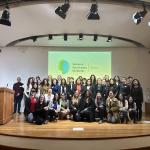DURHAM, NC — Immigrant entrepreneurs founded 25.3 percent of the U.S. engineering and technology companies established in the past decade, according to a new study from Duke University. What’s more, foreign nationals — those living in the United States who are not citizens — contributed to an estimated 24.2 percent of international patent applications in 2006.
The study, conducted by a student research team at Duke’s Master of Engineering Management Program, brings new context to the nation’s immigration debate. Until now, much of the discourse has focused almost exclusively on unskilled laborers who cross the U.S. border illegally, primarily from Latin American countries. The team is providing its project results online to contribute to the overall national discussion.
“To sustain our economic and global competitiveness, America needs to focus on its many strengths. One of these is our ability to attract and assimilate the world’s best and brightest,” said Vivek Wadhwa, executive in residence at the Pratt School of Engineering’s Master of Engineering Management Program. Wadhwa himself is an immigrant who has co-founded two technology companies.
The Duke research team of 18 students from the Master of Engineering Management Program was led by Wadhwa, research scholar Ben Rissing and Gary Gereffi, director of the Center for Globalization, Governance & Competitiveness and a professor of sociology at Duke. The team was assisted by Dean and Professor AnnaLee Saxenian at the UC Berkeley School of Information. The study builds on research Saxenian published in 1999 that focused on the development of Silicon Valley’s regional economy and the roles of immigrant capital and labor in this process.
The team contacted thousands of engineering and technology companies founded between 1995 and 2005 to determine if the CEO or lead technologist was an immigrant, and to determine that person’s national origin. More than 2,050 companies participated in the telephone survey.
The researchers found there was at least one immigrant key founder in 25.3 percent of these companies. Together, the study report says, this pool of immigrant-founded companies was responsible for generating an estimated $52 billion in 2005 sales and creating just under 450,000 jobs as of 2005.
Almost 26 percent of all immigrant-founded companies in the past 10 years were founded by Indian immigrants. Immigrants from the United Kingdom, China and Taiwan contributed to 7.1 percent, 6.9 percent and 5.8 percent of all immigrant-founded businesses, respectively.
These immigrant-founded businesses were unevenly located across the country. California and New Jersey represented hot spots for immigrant-founded engineering and technology businesses; Washington and Ohio possessed relatively low percentages of immigrant-founded businesses.
Some immigrant groups displayed tendencies to start businesses in a particular state. For example, 81 percent of businesses founded by immigrants from Taiwan were located in California.
The Duke team also did a special analysis of two tech centers — Silicon Valley, Calif., and Research Triangle Park, N.C.
The researchers found that over half (52.4 percent) of Silicon Valley startups had one or more immigrants as a key founder, compared with the California average of 38.8 percent. A comparison with Saxenian’s 1999 findings shows that the percentage of firms with Indian or Chinese founders had increased from 24 percent to 28 percent by 2006. Indian immigrants had also outpaced their Chinese counterparts as founders of engineering and technology companies in Silicon Valley.
In Research Triangle Park, 18.7 percent of startups surveyed had an immigrant as a key founder, compared with the North Carolina average of 13.9 percent. Indians constitute the largest immigrant founding group, with 25 percent of startups, followed by immigrants from Germany and the United Kingdom, each with 15 percent.
"In places like Silicon Valley we see the compounding impacts of immigrant social and technical networks,” Saxenian said. “As foreign-born engineers start businesses, they collaborate with former classmates and colleagues from their home countries — sharing the business contacts and know-how as well as market information that support entrepreneurial success. Successful entrepreneurs not only contribute to the regional economy, but also become powerful role models and mentors, attracting subsequent generations of immigrants to the area.”
To understand the intellectual contribution of skilled immigrants, the Duke team analyzed the World Intellectual Property Organization Patent Cooperation Treaty database for international patent applications filed in the United States.
The researchers estimated that foreign nationals residing in the United States were named as inventors or co?inventors in 24.2 percent of such international patent applications in 2006. This percentage increased dramatically from 7.3 percent in 1998. This count does not include immigrants who became U.S. citizens before filing a patent application. The largest group of contributors was of Chinese origin. They were followed by Indians, Canadians and British.
“The contributions immigrants and foreign national residents are making to our economy — and particularly to science and technology — are well recognized and this report is a start at documenting the statistics of those contributions,” said Kristina Johnson, dean of Duke’s Pratt School of Engineering. “The United States has a long history of welcoming international students and entrepreneurs — and has benefited greatly as a result.
“Looking at this research from the perspective of the U.S. educational system, the study continues to reveal challenges facing our K-12 educational program,” Johnson said. “As the economies of other nations improve, more immigrant non-citizens living in the United States may choose to repatriate. Given the large percentage of high-tech companies started by these individuals, the nation may be forced to look more and more to domestic students for continued innovation. Without dramatically improving our pre-college science and technology preparation, the United States risks losing its competitiveness in the future global economy.”
The Master of Engineering Management team led by Wadhwa has been researching the impact of globalization on the engineering profession and U.S. competitiveness. In December 2005, the team published a study that countered the assertion that India and China were graduating 12 times the number of engineers as the United States. A subsequent study published in 2006 analyzed the experiences of companies engaged in outsourcing and found that the key factors in outsourcing were cost and proximity to markets — not a skills shortage in the United States. Both studies are available at http://www.memp.pratt.duke.edu.
Students contributing to the study include Ramakrishnan Balasubramanian, Pradeep Kamsali, Nishanth Lingamneni, Chris Morecroft, Niyanthi Reddy, George Robinson, Batul Tambawalla, Mark Weaver, Zhenyu Yang, Gloria Gyamfi, Laura Higbie, Amanda McCain, Marine Raoux, Anand Sankar, Chuntat Tan, Payman Tayebi, Rachel Wu and Tarun Wadhwa.
Special thanks to Mark Lavender of Neopates, Raleigh, NC, John P. Harvey in Canberra Australia, and the Duke Statistical Consulting Center for their assistance with this study.
For more information, see the full report: “America’s New Immigrant Entrepreneurs.”









